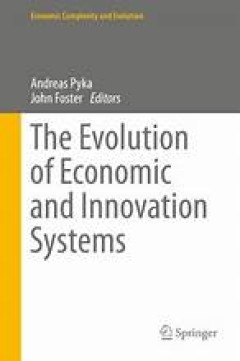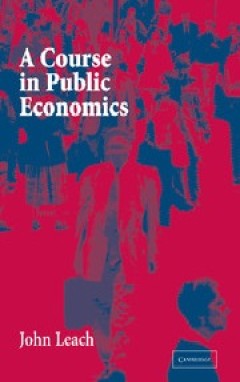Filter by

The First Decade of Living with the Global Crisis
This volume sheds new light on economic developments in several countries of Southeast Europe. The European Union and especially the eurozone continue to experience rhythms of fiscal crisis, as can most clearly be seen in the debt crisis in the South Periphery. Despite the fact that several measures and decisions have been taken to deal with the crisis (banking union, liquidity support from the…
- Edition
- 1
- ISBN/ISSN
- 978-3-319-24267-5
- Collation
- XII, 192, 19 b/w illustrations, 6 illustrations in colour
- Series Title
- Contributions to Economics
- Call Number
- -

The Evolution of Innovation Networks
Tobias Buchmann analyzes innovation network dynamics in the German automotive industry. The study is based on a model for analyzing the complex evolution of innovation networks and the driving mechanisms underlying network evolution derived from theoretical and empirical findings in innovation economics, economic geography and management science. The author uses established social network analy…
- Edition
- -
- ISBN/ISSN
- 978-3-658-10383-5
- Collation
- XVII, 235, 29 b/w illustrations
- Series Title
- -
- Call Number
- -

The Evolution of Economic and Innovation Systems
This book is at the cutting edge of the ongoing ‘neo-Schumpeterian’ research program that investigates how economic growth and its fluctuation can be understood as the outcome of a historical process of economic evolution. Much of modern evolutionary economics has relied upon biological analogy, especially about natural selection. Although this is valid and useful, evolutionary economists h…
- Edition
- 1
- ISBN/ISSN
- 978-3-319-13299-0
- Collation
- VII, 641, 39 b/w illustrations, 63 illustrations in colour
- Series Title
- Economic Complexity and Evolution
- Call Number
- -

The European Union and the BRICS
This book explores the relations between the EU and the BRICS in the areas of politics, economic development, trade and security. The contributions cover topics such as the position of the EU and BRICS in the global order and the EU as a "normative power," as well as the evolution, characteristics and institutionalization of BRICS and the roles of its member countries Brazil, Russia, India, Chi…
- Edition
- 1
- ISBN/ISSN
- 978-3-319-19099-0
- Collation
- X, 180, 3 illustrations in colour
- Series Title
- -
- Call Number
- -

A Course on Cooperative Game Theory
Cooperative game theory deals with situations where objectives of participants of the game are partially cooperative and partially conflicting. It is in the interest of participants to cooperate in the sense of making binding agreements to achieve the maximum possible benefit. When it comes to distribution of benefit/payoffs, participants have conflicting interests. Such situations are usually …
- Edition
- -
- ISBN/ISSN
- 9781107415997
- Collation
- -
- Series Title
- -
- Call Number
- -

The Economics of the Popular Music Industry
This Palgrave Pivot uses modeling from microeconomic theory and industrial organization to demonstrate how consumers and producers have responded to major changes in the music industry. Byun examines the important role of technology in changing its structure, particularly as new methods of creating and accessing music prove to be a double-edged sword for creators and producers. An underlying th…
- Edition
- 1
- ISBN/ISSN
- 978-1-137-46705-8
- Collation
- VIII, 128
- Series Title
- -
- Call Number
- -

The Economics of Professional Road Cycling
Over the past decade, a growing body of academic literature on the economics of road cycling has been amassed. This book is the first volume to bring together a majority of the academic research and knowledge on the economics and management of professional road cycling. Each chapter treats a particular economic aspect of the sport, from organizational structure to marketing, labor, game theory,…
- Edition
- 1
- ISBN/ISSN
- 978-3-319-22312-4
- Collation
- X, 341,
- Series Title
- Sports Economics, Management and Policy
- Call Number
- -

The Economics of Multitasking
People regularly multitask, though we have been warned about the mental costs of "task-switching" in psychology and the popular press. Meanwhile, economists have remained silent on the possible economic ramifications – both good and bad – of producers and/or consumers doing more than one thing at once. This first-of-its-kind volume explores the frequency, patterns, and economic implications…
- Edition
- 1
- ISBN/ISSN
- 978-1-137-38144-6
- Collation
- XV, 216
- Series Title
- -
- Call Number
- -

A Course in Public Economics
A Course in Public Economics, first published in 2004, explores the central questions of whether or not markets work, and if not, what is to be done about it. The first part of the textbook, designed for upper-level undergraduates and first-year graduate students, begins with an extended discussion of the two theorems of welfare economics. These theorems show that competitive markets can give r…
- Edition
- -
- ISBN/ISSN
- 9780511754180
- Collation
- -
- Series Title
- -
- Call Number
- -

A Field of One's Own Gender and Land Rights in South Asia
This is the first major study of gender and property in South Asia. In a pioneering and comprehensive analysis Bina Agarwal argues that the single most important economic factor affecting women's situation is the gender gap in command over property. In rural South Asia, the most significant form of property is arable land, a critical determinant of economic well-being, social status, and empowe…
- Edition
- -
- ISBN/ISSN
- 9780511522000
- Collation
- -
- Series Title
- Cambridge South Asian Studies (58)
- Call Number
- -
 Computer Science, Information & General Works
Computer Science, Information & General Works  Philosophy & Psychology
Philosophy & Psychology  Religion
Religion  Social Sciences
Social Sciences  Language
Language  Pure Science
Pure Science  Applied Sciences
Applied Sciences  Art & Recreation
Art & Recreation  Literature
Literature  History & Geography
History & Geography